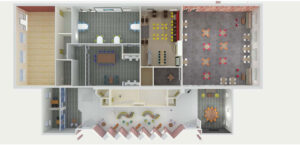by The Cowl Editor on October 20, 2017
News
by Hannah Langley ’21
News Staff

As you are walking to Slavin to get your iced coffee or heading to Raymond Dining Hall to grab a bite to eat, you have probably noticed the construction crews and renovation vans surrounding Moore Hall. This project, which began in May 2017, is scheduled to be completed in just a few weeks, no later than Nov. 3, for the celebration of Providence College’s Multicultural Alumni Weekend. Moore Hall’s renovation is all part of an effort to create a space for “inclusive excellence” and “cross cultural engagement,” fittingly called “The Center at Moore Hall: Arts, Culture, and Social Justice.”
While the name is subject to change, the idea is that the center is meant to promote diversity on campus and create a multipurpose space for all students that fosters community, creativity, curiosity, learning, and engagement across several groups both at PC and in the local Smith Hill and Elmhurst communities.
The center’s goal, as Rafael Zapata, the chief diversity officer at the college, stated, is “to emphasize experiences, histories, cultures, and multilayered identities and creative expression of people of color locally, nationally, and globally.” The Center at Moore Hall will also be a space where all students, faculty, and staff can go to relax between classes, study, attend a workshop or gallery opening, or partake in other activities.
Moore Hall has a long history at PC. Built in 1947, it was originally named Antoninus Hall and was home to the business and psychology departments, as well as other classrooms and laboratories. It was remodeled in 1988, funded by Cornelius C. Moore, and became the center for the Development of Western Civilization program until the completion of Ruane in 2013.
The idea of renovating Moore Hall was spearheaded by Zapata back in 2015, and, after some controversy, was approved early this year. Zapata was thrilled that his plan was approved, but he was concerned about funding and finding the resources necessary to complete Moore Hall’s renovation. Zapata stated, “It was the work of student activists — particularly the Board of Representatives — and their allies among students, faculty, and staff, that led to the College’s commitment [of] over $1.2 million for the extensive renovations of what was a very old and flawed building. We are deeply indebted to the students for those efforts, and I applaud the College for responding to their needs.”
The Center at Moore Hall is meant to create a separate space for programs and large events, as well as to provide a “chill space” for all those on campus to study, relax, and hang out. Because of the building’s central location on campus, people will be able to have the opportunity to stop in the Center going to and from classes, meetings, or their dorm rooms. The goal is to promote the creation of new activities, workshops, classes, and art work not previously available on campus, and allow all people to explore, learn, and engage with the space in a variety of new and exciting ways and make new connections.
The Center is set to feature large spaces for events, dinners, lectures, chill/lounge space, learning spaces and classrooms for small lectures, meetings, and workshops, and collaboration spaces for seminars and meetings. The building will also be used to promote the arts and culture with a gallery, dance studio, arts café for poetry slams, and small theatrical productions.
The Center at Moore Hall will officially be opened on Saturday, November 4, which will also feature a lunch with a series of panels on diversity, equity, and inclusion at PC. Renovations and construction are nearly completed; the final piece will be murals painted by Philadelphia-based Puerto Rican artist, Betsy Casañas. She will begin her work Wednesday, October 18, and will continue for the next several weeks. Zapata welcomes any volunteers who would like to assist Casaña before the unveiling of the building in early November. Those interested in helping should go to the Center or Zapata’s office in Harkins 210.
Zapata has high hopes for the center and the PC community’s role in promoting its use. He is especially excited that the space will allow for events, conversations, plays, gallery openings, and other programs that were not available on campus, as well as the idea that students, faculty, and staff, especially those of color, will be able to see themselves more fully represented through the content, art, and culture of the building’s renovations and programs.
He also hopes it will provide new learning opportunities for members of the extending community, all in the goal to “fully affirm our shared values and aspirations as a Catholic and Dominican liberal arts college in the heart of the city of Providence.”